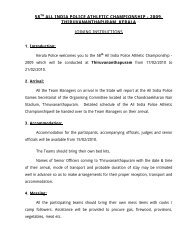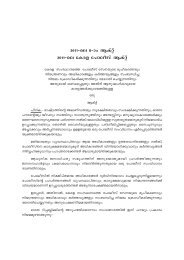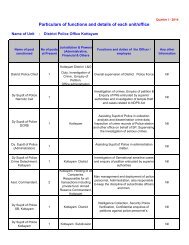Janamaithri Suraksha Project - Kerala Police
Janamaithri Suraksha Project - Kerala Police
Janamaithri Suraksha Project - Kerala Police
Create successful ePaper yourself
Turn your PDF publications into a flip-book with our unique Google optimized e-Paper software.
However, even after Independence, there were not many significant changes brought about<br />
in that system. In official circles, the old viewpoint about the cooperation of the public continued to<br />
hold sway. We were unsuccessful in bringing about the necessary behavioral changes or guidelines<br />
that would put into effect the principle that it is only proper that the laws passed by the people need<br />
to be enforced with the cooperation of the people themselves for their own safety.<br />
Law and Order is a basic need of the people. It is the duty of Government and the <strong>Police</strong><br />
appointed by the Government to sub-serve this need of the people. An approach that provides<br />
security services to local communities appropriate to the circumstances and needs of the local<br />
communities, by enlisting the cooperation of the people and understanding their security needs is<br />
what is envisaged by Community Policing.<br />
Usually, the common man will go to an Indian <strong>Police</strong> Station only if there is no other alternative.<br />
Ordinarily a citizen does not like to complain to the <strong>Police</strong> about a trivial anti-social incident in the<br />
community. On the one hand, there is a nuisance caused by the anti-social element responsible<br />
for this incident, and on the other, there is a dislike to undergo the difficulties faced when complaining<br />
to the police, although this is, more often than not, based only on hearsay. It is not surprising,<br />
therefore, that one feels, It is better to suffer silently, let me not bother. However, this approach<br />
only increases the power and confidence of the said anti-social. It is only when the anti-social<br />
graduates to a goonda that he comes to the attention of the <strong>Police</strong>. By this time, however, using<br />
the money he has earned through his activities, he has already developed an influential network of<br />
supporters. Even if by any chance, police are enabled to take any action against him, the common<br />
man is afraid to be a witness against him.<br />
Thus, on one side, doubts about the <strong>Police</strong>, and on the other, a fear of the goonda. As a<br />
result, the citizen is effectively denied the rights conferred on him by the legal system in a<br />
democracy. At the same time, due to the fear of the citizens in coming forward as witnesses, the<br />
criminal gets the protection of the very same legal system! If this situation continues, the people<br />
will lose their faith in the democratic legal system as well as in the police. At least once in a while,<br />
they will hope for a good and all-powerful protector, and a police that readily delivers instant justice.<br />
Only if police stations evolve into establishments where citizens can enter without fear can we<br />
create a police organization that has the trust of the people. For this to happen, keep all the people in<br />
fear, by this, all the criminals in the community will also be afraid; thus no one will commit crimes - this<br />
thought must be removed both from the police as well as from the community. If everyone fears the<br />
police, poor victims will hesitate to complain. Witnesses will not cooperate. <strong>Police</strong> will not receive<br />
information from the public. On the other hand, if people see the police as friends, with the cooperation<br />
of the good people that constitute a majority in the community, the criminal elements, which form only<br />
a small percentage, can be controlled, and the laws enforced effectively.<br />
The total number of people who get arrested in one year in <strong>Kerala</strong> is about 1,50,000. Of<br />
this, the great majority are drivers who get involved in traffic accidents, and people who commit<br />
criminal acts on the spur of the moment. Those who get arrested for theft, robbery, goonda acts,<br />
etc. comprise only a very small percentage. The work of police to control these criminal elements,<br />
that come to less than ten thousand, will be much easier if the cooperation of the other 330 lakhs<br />
who are law-abiding citizens is enlisted. Faith in the legal system will increase. Rather than enforcing<br />
the law by making both the good and bad elements afraid of the police, it is better to counter the<br />
activities of the criminal elements with the cooperation of the 99.9% people who are, in general,<br />
law- abiding.<br />
In every locality, opportunities must be created to enable people to put forward their needs<br />
to the police as well as to encourage people to interact with the police. The feeling that police are<br />
3

















